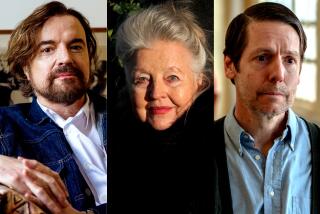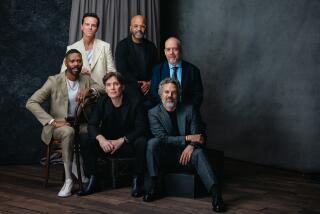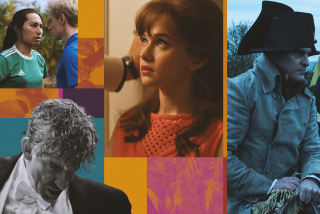‘An Ideal Husband’ Withstands Test of Time
- Share via
What is so swiftly striking about Oliver Parker’s exhilarating and elegant film of Oscar Wilde’s “An Ideal Husband” is how very contemporary it is in its consideration of morality--or lack of same--in both personal and public life. Wilde was always about lots more than witty repartee, and as sparkling as his play is as drawing-room comedy, it reveals his concern with the timeless values of unselfish love and forgiveness. Parker has shaped the play to make it more film-friendly and relevant, but he has done so with such subtlety you would have to be a Wilde authority even to notice.
Britain a century ago was the world’s superpower that America is now, and its hero, Sir Robert Chiltern (Jeremy Northam), a member of Parliament heralded as “the last decent man in London.” He is poised on the threshold of a brilliant career, with the prime minister’s office the ultimate goal, surely. He has a vision of a responsible empire embodied in his slogan, “Commerce with a conscience,” which sounds lots like a certain presidential candidate’s advocacy of “compassionate conservatism.” Yet there is a dark secret in his life, one that most people would find far more damaging than l’affaire Lewinsky, one that makes him vulnerable to the bewitching blackmailer, Mrs. Cheveley (Julianne Moore).
Mrs. Cheveley, whose unabashed glamour and insinuating manner set her apart from more proper women, has descended upon the dashing Sir Robert at his grand London residence (looking only slightly less posh than Buckingham Palace) during a glittery soiree presided over by Sir Robert’s gracious and devoted wife, Gertrude (Cate Blanchett), a lovely young woman of noble character and intelligence. Mrs. Cheveley is nothing if not direct with Sir Robert: He is to stand up in Parliament and endorse a fraudulent scheme for a canal in Argentina in which she has heavily invested or she will make public a letter that will reveal just how he, born poor but clearly well-connected, made his fortune. (Moore is as memorable an adventuress as Paulette Goddard was in Alexander Korda’s 1948 film version of the Wilde play.)
When a desperate Sir Robert turns for help to his friend Lord Goring (Rupert Everett), “An Ideal Husband” at once broadens and deepens its scope, heightens its humor and shifts its focus to Goring, who becomes the film’s dominant presence, especially as played with such scene-stealing wit and style by Everett.
There is a great deal of Wilde in both men, for like Sir Robert, Wilde was a loving, though in his case flagrantly errant, husband, and like Lord Goring in that his mastery of the epigram belied a fundamental seriousness. The kind of epic-scale scandal that threatens to engulf Sir Robert as the millennium approaches of course in fact did destroy Wilde--while in fact “An Ideal Husband” was playing in London.
Mischievous, indolent and given to outrageous yet knowing pronouncements almost every time he opens his mouth, Lord Goring is just the man of the world to deal with the opportunistic Mrs. Cheveley, to whom he was once briefly engaged. She insists on taking a “we’re birds of a feather” approach to a man she would still like to land, thus seriously underestimating Lord Goring’s actually quite formidable strength of character, solid values and unflinching courage.
Yet as Lord Goring commences to act, he also inadvertently sets himself on a course of responsible conduct that will endanger his cherished bachelor status, making it harder to resist his own candidacy as an ideal husband--to Sir Robert’s strong-willed yet enchanting sister Mabel (Minnie Driver) who chafes at the propriety of not making perfectly clear her love for him. What’s more, Lord Goring’s father, Lord Caversham (John Wood), is eager to see his son tie the knot. An amusing confusion on the part of Lord Goring’s redoubtable butler (Peter Vaughan) allows fate to interact with character in the unraveling of an increasingly complicated plot.
Parker reveals the same deftness here in bringing Wilde to the screen as he did in Shakespeare’s “Othello,” with Laurence Fishburne a striking Moor of Venice. As before, purists may object to Parker’s streamlining a stage classic in adapting it to film. The rest of us, meanwhile, can be delighted that his “Ideal Husband,” like “Othello,” is a real movie rather than a filmed play. We can also take pleasure in how he’s turned his stars into a stunning ensemble who are at once able to bring out the humor as well as the seriousness in Wilde.
You have the feeling that the actors are enjoying themselves--a feeling that is felicitously contagious. It is a special joy to see Blanchett shine, freed once again from the self-important ponderousness of “Elizabeth,” as admirable as she was in last year’s Oscar-nominated hit. The film also consolidates the wide appeal and recognition Everett established with “My Best Friend’s Wedding,” and in the wake of “The Winslow Boy” confirms the formidable talent and charisma of Northam.
Not surprisingly, “An Ideal Husband” is also the kind of glorious period piece the British do so well, with sumptuous settings and costumes that in this instance, however, never overwhelm story and character. Say what you will about the constrictions of corsets, trains and elaborate hairstyles in this era of the liberated, natural-looking woman, Caroline Harris’ 1890s costumes remind us how deeply romantic and highly flattering they could be; you could say the same for the men’s handsome, well-cut formal attire. Vital and buoyant, “An Ideal Husband” continues in an impressive manner the resurgence of interest in Wilde as the centennial of his death approaches.
* MPAA rating: PG-13, for brief nudity/sexuality. Times guidelines: adult themes and situations.
‘An Ideal Husband’
Cate Blanchett: Lady Gertrude Chiltern
Minnie Driver: Mabel Chiltern
Rupert Everett: Lord Arthur Goring
Julianne Moore: Mrs. Cheveley
Jeremy Northam: Sir Robert Chiltern
A Miramax Films presentation of a Fragile Film in association with Icon Productions, Pathe Pictures and the Arts Council of England. Director Oliver Parker. Producers Barnaby Thompson, Uri Fruchtmann and Bruce Davey. Executive producers Susan B. Landau, Ralph Kemp, Andrea Calderwood. Based on the play by Oscar Wilde. Screenplay adaptation by Parker. Cinematographer David Johnson. Editor Guy Bensley. Music Charlie Mole. Costumes Caroline Harris. Production designer Michael Howells. Art director Rod McClean. Set decorator Katie Lee Running time: 1 hour, 37 minutes.
At selected theaters in Los Angeles and Orange counties.
More to Read
Only good movies
Get the Indie Focus newsletter, Mark Olsen's weekly guide to the world of cinema.
You may occasionally receive promotional content from the Los Angeles Times.










